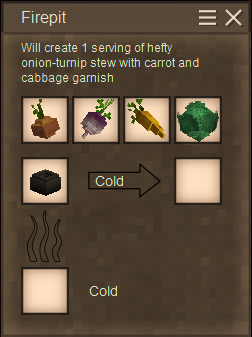Meal
A meal is a consumable food item that is created by cooking various foodstuffs in a cooking pot. Preparing a meal improves the satiety of the ingredients and halts the progression of hunger for a time upon consumption.
Creation
Create a cooking pot and place it on a fueled firepit with ![]() , then
, then ![]() the fire pit to open the creation window, where 4 slots will display for ingredients to be added. Meals can be made out of a mix of ingredients, but must be made according to specific recipes for the game to register them as valid meals. Certain recipes require ingredients to be placed in a specific order in the cooking pot as well. Recipes can be multiplied in order to make multiple servings at a time, up to a maximum of six servings, but the ratio of each ingredient must match the total servings.
the fire pit to open the creation window, where 4 slots will display for ingredients to be added. Meals can be made out of a mix of ingredients, but must be made according to specific recipes for the game to register them as valid meals. Certain recipes require ingredients to be placed in a specific order in the cooking pot as well. Recipes can be multiplied in order to make multiple servings at a time, up to a maximum of six servings, but the ratio of each ingredient must match the total servings.
If the contents of the cooking pot can be turned into a meal, the creation window will list the name of the meal at the top, and an animation and sounds of a bubbling pot will play.
Certain foods that cannot be eaten raw, such as soybeans and cassava, can be used to cook meals.
Types of meals
Every meal uses one or more types of ingredient as its basis, which must occupy certain slots in the cooking pot in order to register as a valid meal. These ingredient types include foods such as vegetables, mushrooms, meat or grain.
Meals are named after the ingredients used to produce them. The name format is generally in the following form:
(Hefty/Hearty) [Ingredient 1]-[Ingredient 2] [meal type] with [ingredient 3] and [ingredient 4] garnish/topping
Meals that have three different primary ingredients are called "hearty" meals, while meals with four different primary ingredients are called "hefty" meals. For example, a vegetable stew made with onion, turnip and carrot would be called "Hearty onion-turnip stew with carrot garnish", while a vegetable stew with onion, turnip, carrot and cabbage would be "Hefty onion-turnip stew with carrot and cabbage garnish". Honey, if added as an optional ingredient, is called a "topping".
The names are purely descriptive and have no additional impact on a meal's effects.
Usage
Once a meal is cooked it will be stored in the cooking pot. In order to eat the meal, the cooking pot must be placed on a block using Shift + ![]() or left on the fire pit. Equip a bowl and
use it on the cooking pot to fill the bowl with a single serving. The player can then eat from the bowl.
or left on the fire pit. Equip a bowl and
use it on the cooking pot to fill the bowl with a single serving. The player can then eat from the bowl.
Meals can also be placed into crocks to preserve them. To do so, equip the crock and use it on the cooking pot or bowl containing the meal. Preserved crocks can then be sealed with fat and placed in a cellar to further extend their shelf life.
Improved satiety
Once a player consumes a meal, it will halt satiety loss for a short time, so the player will eat less food overall. For every 100 satiety granted by meals, the satiety bar will stop decreasing for 30 seconds. In addition, the ingredients used in the meal will provide more satiety than if they were eaten raw.
History
- Before version 1.18.0, soybeans and peanuts could not be used as the primary ingredients of vegetable stew, only as an add-on.
- Until version 1.18.0 verify? the maximum serving size of all meals was four.
| Food and Cooking | |
|---|---|
| Finding food | Foraging • Farming • Animal husbandry • Cooking |
| Edibles | Fruit • Vegetable • Meat • Grain • Mushroom • Honey • Cheese |
| Meals | Vegetable stew • Meat stew • Soup • Porridge • Scambled eggs • Bread • Pie |
| Food preservation | Pickles • Cured meat • Jam • Cheese • Alcohol • Cellar |
| Cooking tools | Firepit • Clay oven • Cooking pot • Quern |
| Utensils | Bowl • Crock • Storage vessel |
| Other links | Room • Satiety |
| Wiki Navigation | |
|---|---|
| Vintage Story | Guides • Frequently Asked Questions • Soundtrack • Versions • Controls |
| Game systems | Crafting • Knapping • Clay forming • Smithing • Cooking • Temperature • Hunger • Mining • Temporal stability • Mechanical power • Trading • Farming • Animal husbandry |
| World | World generation • Biomes • Weather • Temporal storms |
| Items | Tools • Weapons • Armor • Clothing • Bags • Materials • Food |
| Blocks | Terrain • Plants • Decorative • Lighting • Functional • Ore |
| Entities | Hostile entities • Animals • NPCs • Players |
| Miscellaneous | List of client commands • List of server commands • Creative Starter Guide • Bot System • WorldEdit • Cinematic Camera • Adjustable FPS Video Recording • ServerBlockTicking |

